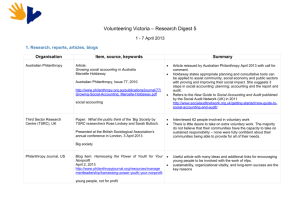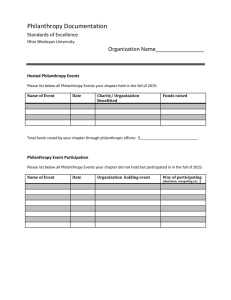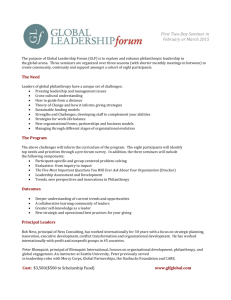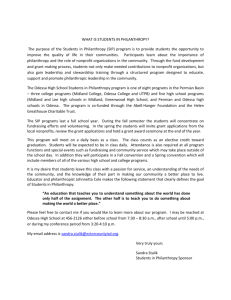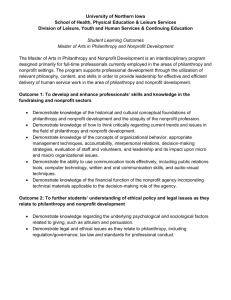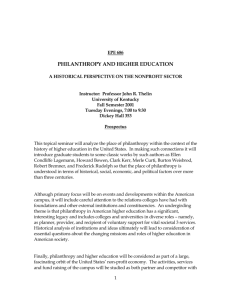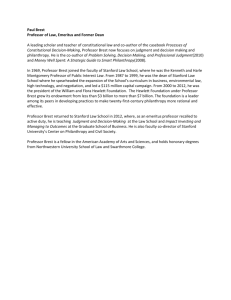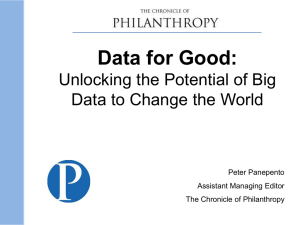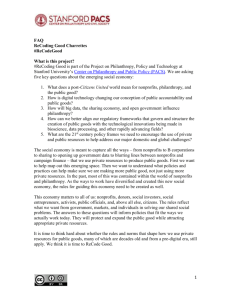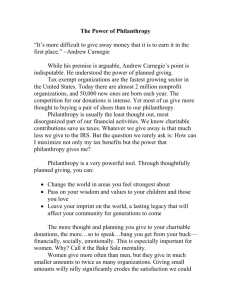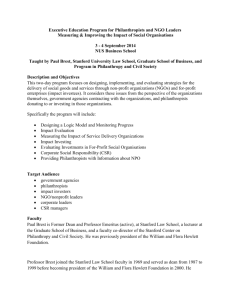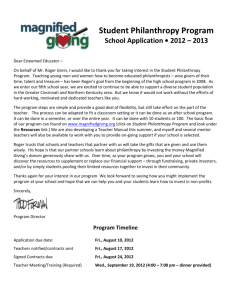Education 374 / Political Science 334 / Sociology 374
advertisement
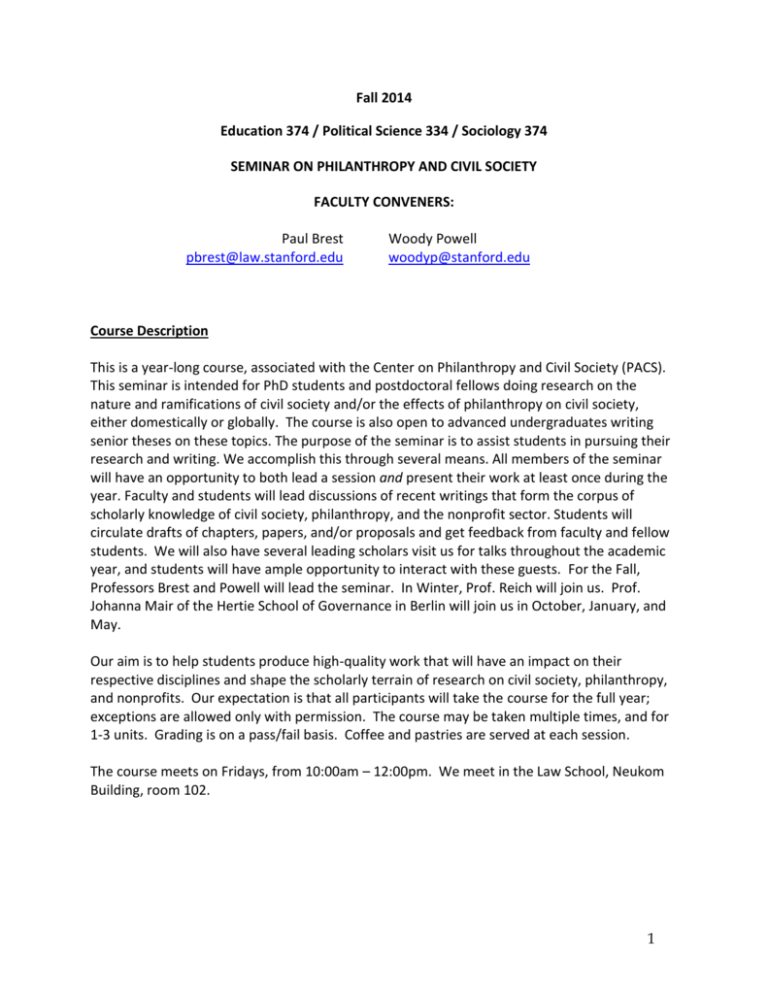
Fall 2014 Education 374 / Political Science 334 / Sociology 374 SEMINAR ON PHILANTHROPY AND CIVIL SOCIETY FACULTY CONVENERS: Paul Brest pbrest@law.stanford.edu Woody Powell woodyp@stanford.edu Course Description This is a year-long course, associated with the Center on Philanthropy and Civil Society (PACS). This seminar is intended for PhD students and postdoctoral fellows doing research on the nature and ramifications of civil society and/or the effects of philanthropy on civil society, either domestically or globally. The course is also open to advanced undergraduates writing senior theses on these topics. The purpose of the seminar is to assist students in pursuing their research and writing. We accomplish this through several means. All members of the seminar will have an opportunity to both lead a session and present their work at least once during the year. Faculty and students will lead discussions of recent writings that form the corpus of scholarly knowledge of civil society, philanthropy, and the nonprofit sector. Students will circulate drafts of chapters, papers, and/or proposals and get feedback from faculty and fellow students. We will also have several leading scholars visit us for talks throughout the academic year, and students will have ample opportunity to interact with these guests. For the Fall, Professors Brest and Powell will lead the seminar. In Winter, Prof. Reich will join us. Prof. Johanna Mair of the Hertie School of Governance in Berlin will join us in October, January, and May. Our aim is to help students produce high-quality work that will have an impact on their respective disciplines and shape the scholarly terrain of research on civil society, philanthropy, and nonprofits. Our expectation is that all participants will take the course for the full year; exceptions are allowed only with permission. The course may be taken multiple times, and for 1-3 units. Grading is on a pass/fail basis. Coffee and pastries are served at each session. The course meets on Fridays, from 10:00am – 12:00pm. We meet in the Law School, Neukom Building, room 102. 1 Readings: All readings will be posted to Coursework, save for those in the following book: W.W. Powell and R. Steinberg, The Nonprofit Sector, 2nd edition, Yale University Press, 2006 is available as a Stanford E-book. The link is here: http://site.ebrary.com/lib/stanford/detail.action?docID=10210281 FALL QUARTER SCHEDULE: September 26: Introduction Everyone will give a short introduction to their research interests (and will post a description on the Coursework page.) We will discuss how different social science disciplines think about theory and data. The goal is to get us to enlarge our respective fields of vision, and see how other disciplines decide what is interesting. October 3: Why do nonprofits exist in a market society? Henry Hansmann, “Economic Theories of the Nonprofit Organizations,” Powell, The Nonprofit Handbook, 1st edition. Peter Frumkin, “The Idea of a Nonprofit and Voluntary Sector,” from his On Being Nonprofit, Harvard U.P., 2002. Dennis Young, “Government Failure Theory” and “Contract Failure Theory,” International Encyclopedia of Public Policy and Administration, 1989. Burton A. Weisbrod. “The Future of the Nonprofit Sector: Its entwining with private enterprise and government.” Journal of Policy Analysis and Management 16, 4 (1997): 541-55. October 10: Why do people give? Alan Wolfe, “What is Altruism?” excerpt from Private Action and the Public Good, W. Powell and E. Clemens, eds., Yale U.P., 1998. Mark Musick and John Wilson, “What is volunteering?” from Volunteers: A Social Profile, Indiana U.P., 2008. William Harbaugh, “What do donations buy? A model of philanthropy based on prestige and warm glow.” Journal of Public Economics 7 (1998): 269-284, 2 Dan Lainer Vos. “Brothers’ Keepers: gift-giving networks and the organization of the Jewish American diaspora.” Socio-Economic Review 12(3) 2014: 463-88. October 31: What is Civil Society? Putnam, Robert D., Robert Leonardi, and Raffaella Y. Nanetti. Making Democracy Work: Civic Traditions in Modern Italy. Princeton: Princeton University Press, 1994. Chapter 6. Putnam, R., “Bowling Alone: America’s Declining Social Capital. Journal of Democracy 6:1, 1995. Elisabeth Clemens. “The Constitution of Citizens: Political Theories of Nonprofit Organizations.” Chapter 9 in the Powell and Steinberg volume, 2006. deTocqueville, Alexis. Democracy in America. Translated by Henry Reeve. 1899. http://xroads.virginia.edu/~Hyper/DETOC/toc_indx.html. Read “Of the Uses which the Americans Make of Public Associations and Relation f Civil to Political Associations.” Michael Edwards. “Civil Society as Associational Life.” Excerpt from his Civil Society, O.U.P. 2009. November 14: Civil Society and Inequality Els de Graauw, Shannon Gleeson, and Irene Bloemraad. “Funding Immigrant Organizations: Suburban Free Riding and Local Civic Presence.” American Journal of Sociology 119, 1 (July 2013): 75-130. Edward T. Walker, Michael McQuarrie, and Caroline Lee. “Rising Participation and Declining Democracy,” in Democratizing Inequalities, NYU Press, forthcoming in 2015. Mario Luis Small, Unanticipated Gains: Origins of Network Inequality in Everyday Life. Oxford University Press, 2009, Chapters 1 and 8. Rob Reich. “Towards a Political Theory of Philanthropy,” pp. 177-195 in Giving Well: The Ethics of Philanthropy, 2011. December 12: Why do people give? 2.0 James Andreoni, Justin M. Rao, Hannah Trachtman. “Avoiding The Ask: A Field Experiment on Altruism, Empathy, and Charitable Giving,” 2011 NBER working paper #17648. Dan Ariely, Anat Bracha, and Stephan Meier. “Doing Good or Doing Well? Image Motivation and Monetary Incentives in Behaving Prosocially.” American Economic Review 99(1): 544-55. 3 Kevin Lewis, Kurt Gray, Jens Meierhenreich. “The Structure of Online Activism,” Sociological Science 2014, vol. 1. Andreas Tilcsik and Christopher Marquis, “Punctuated Generosity: How Mega-events and Natural Disasters Affect Corporate Philanthropy in the U.S. Communities. Administrative Science Quarterly 58, 1 (2013): 111-48. Other dates to keep in mind: October 3: November 20: December 3: WINTER DATES: SPRING DATES: Beginning of the year reception PACS Faculty Seminar PACS Holiday Party Jan. 9, 23; Feb. 6, 20; March 13 April 10, 24; May 8, 22; June 5 4
